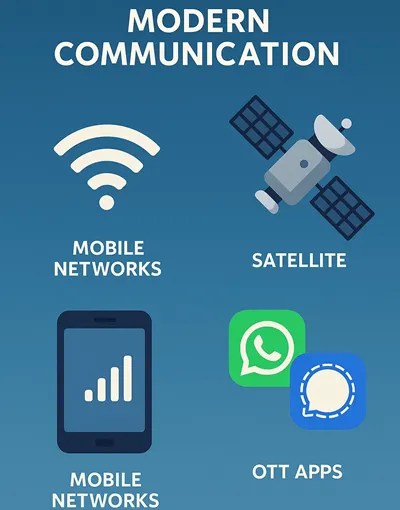
The Telecommunications Act, 2023 is India's new law that replaces old telecom regulations and brings all forms of communication—calls, SMS, internet, and even apps like WhatsApp and Telegram—under one umbrella.
It gives the government more powers to regulate telecom, ensures stricter security checks, tackles spam/scam calls, and prepares India for 5G and future technologies.
Key Highlights
- Covers All Communication – Mobile, Wi-Fi, satellite, and messaging apps.
- Government Powers – Can suspend or control telecom during emergencies, wars, or disasters.
- Strict SIM Verification – Mandatory KYC before issuing SIM cards.
- Consumer Protection – Crackdown on spam calls, fraud messages, and poor service.
- Licensing Rules – Telecom operators must get government approval.
- National Security – Government can block harmful messages or apps.
- Tech-Friendly – Supports 5G, satellite internet, and rural expansion.
Where to Complain
- Telecom Service Providers (Airtel, Jio, BSNL, etc.) – First point of complaint.
- Department of Telecommunications (DoT) – https://dot.gov.in
- TRAI (Telecom Regulatory Authority of India) – https://trai.gov.in
State-Wise Complaint Portals for Telecom Issues
| State/UT | Telecom Complaint Portal |
|---|---|
| Delhi | https://dot.gov.in/delhi |
| Maharashtra | https://eservices.dot.gov.in/taxonomy/term/265 |
| Uttar Pradesh | https://eservices.dot.gov.in/taxonomy/term/60 |
| Tamil Nadu | https://eservices.dot.gov.in/taxonomy/term/270 |
| Karnataka | https://eservices.dot.gov.in/taxonomy/term/261 |
| Gujarat | https://eservices.dot.gov.in/taxonomy/term/71 |
| West Bengal | https://trai.gov.in/node/3510 |
(You can access all states via DoT's main site: https://dot.gov.in)
FAQs on the Telecom Act, 2023
-
Q1. Can the internet be shut down during protests or riots?
-
Yes, the government can suspend internet services in emergencies.
-
Q2. Is spam calling now illegal?
-
Yes. Telecom companies must stop spam and face penalties for violations.
-
Q3. Can my WhatsApp or Telegram messages be monitored?
-
Only under strict conditions—like national security or public safety.
-
Q4. Will SIM card verification get tougher?
-
Yes. You must go through proper KYC before getting a SIM.
-
Q5. Can the government block apps?
-
Yes, if they harm security, spread misinformation, or violate rules.
-
Q6. What if my telecom provider cheats me?
-
File a complaint with DoT or TRAI. The Act protects consumer rights.
-
Q7. Can I report spam and marketing calls?
-
Yes. You can block/report them and companies face heavy fines.
-
Q8. Will rural areas get better coverage under this law?
-
Yes, expansion of networks in villages is a key focus.
-
Q9. Can public Wi-Fi be used freely?
-
Yes, but providers must keep user records for verification.
-
Q10. Can my calls be recorded without me knowing?
-
Only lawfully, by authorised agencies in special cases.
-
Q11. Will telecom services become costlier?
-
Not directly. The law ensures fair competition among providers.
-
Q12. What's the punishment for illegal telecom use?
-
Heavy fines or jail if someone uses spectrum/services without a licence.
-
Q13. Can I run my own telecom service?
-
Yes, but only after obtaining a licence from the government.
-
Q14. Does the law protect senior citizens and disabled users?
-
Yes, telecom operators must provide inclusive services.
-
Q15. Will the 5G rollout be faster now?
-
Yes, the law removes hurdles for quick introduction of new technologies.
Add new comment